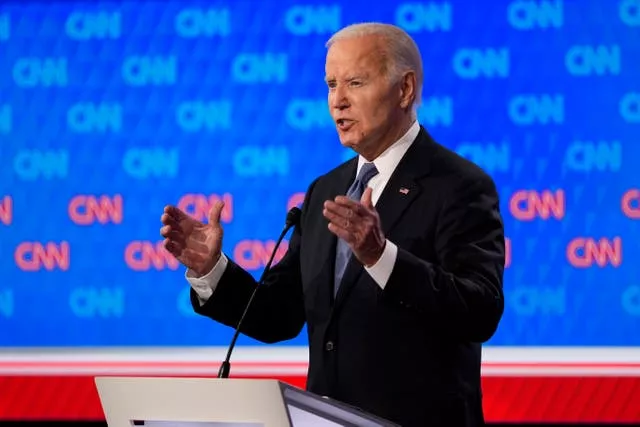Thursday’s US presidential debate was a re-run that featured two candidates with a combined age of 159, but it went especially poorly for one of them, President Joe Biden.
Already fighting voter concerns about his age, Mr Biden, 81, was halting and seemed to lose his train of thought, sparking concerns among Democrats about the man they hope will keep former president Donald Trump from returning to office.
For his part, Mr Trump made repeated false claims and provocative statements. But he seemed smoother and more vigorous than Mr Biden, who is only three years older than the Republican ex-president.
The debate covered a wide range of topics and included a former president — Mr Trump — not backing down from his pledge to prosecute members of Congress and even the man he was debating.
But the overarching theme was the difference between the candidates’ performance.
Here are some takeaways from the face-off.
Style versus substance
Presidential debates are often scored on style and impression more than substance.
Mr Trump was confident and composed, even as he steamrolled facts on abortion and immigration with false assertions, conspicuous exaggerations and empty superlatives.

Mr Biden was often halting, his voice raspy, even when he had the facts on his side. He had difficulty finishing his arguments and marshalling his attacks.
Mr Trump’s supporters have seemed unconcerned about his relationship with the truth, and his performance and delivery helped him.
Mr Biden’s supporters consistently express concern about the president’s age and capacity and he did little to reassure them.
Low road
In what may well be a first in a presidential campaign, Mr Trump called the president a “criminal” and said he could well be prosecuted after he leaves office.
Mr Biden then brought up Mr Trump’s recent criminal trial in New York in which prosecutors presented evidence that the former president had had sex with an adult film actress.
Mr Trump replied: “I didn’t have sex with a porn star.”
Mr Trump’s vow on abortion
Abortion is an issue Democrats think could help deliver a victory in November.

Mr Trump in 2016 campaigned on overturning Roe v Wade, and as president appointed three Supreme Court justices who provided the deciding votes revoking the 49-year right to the procedure.
In response to a question from the moderators, Mr Trump vowed not to go further if he returned to the White House, where his administration would have the authority to outlaw the abortion pill mifepristone, which is widely used.
Overturning Roe is one of Mr Trump’s greatest political vulnerabilities, but on Thursday the former president contended everyone was happy with what he did.
“As far as abortion’s concerned it’s back to the states,” Mr Trump said, contending that the Founding Fathers would have been happy with the end of Roe.
“Everybody wanted it brought back,” he said.
This is not true. Polls have shown significant opposition to overturning Roe and voters have punished Republicans in recent elections for it.

“The idea that the founders wanted the politicians to be the ones making the decisions about women’s health is ridiculous,” Mr Biden shot back.
Border skirmish
In recent months, Mr Biden has tried to reverse his poor public standing over his handling of immigration, first by endorsing a bipartisan Senate proposal with some of the toughest border restrictions in recent memory and then, after that legislation collapsed, taking executive action to clamp down on migrants seeking asylum at the southern border.
But as Mr Biden tried to tout the progress he has made, particularly the 40 per cent drop in illegal border crossings since his border directive was implemented this month, Mr Trump invoked his trademark rhetoric to paint a portrait of a chaotic border under Mr Biden’s watch.
Mr Trump argued, for example, that the migrants arriving at the US border were coming from “mental institutions” and “insane asylums” — a frequent refrain of his at rallies for which he has offered no evidence.
He also claimed the US-Mexico border was the “most dangerous place anywhere in the world” and cited examples of immigrants in the US illegally who had committed violent crimes.
Although some immigrants do commit horrific crimes, a 2020 study published by the National Academy of Sciences found “considerably lower felony arrest rates” among people in the United States illegally than among legal immigrants or native-born.
It’s the economy
The debate began with Mr Biden defending his record on the economy, saying he inherited an economy that was “in a freefall” as it was battered by the pandemic and that his administration had put it back together again.
But after Mr Biden touted his administration’s accomplishments — such as lowering the cost of insulin and the creation of millions of new jobs — Mr Trump boasted that he oversaw the “greatest economy in the history of our country” and defended his record on the pandemic.

Mr Biden retorted: “He’s the only one who thinks that.”
But Mr Trump responded by attacking him on inflation, arguing that he had inherited low rates of inflation when he came into office in January 2021, yet prices “blew up under his leadership.”
Suckers and losers
Mr Biden — whose deceased son, Beau, served in Iraq — had one of his most forceful moments when he went on the attack against Mr Trump’s reported comments in 2018 that he had declined to visit a US military cemetery in France because veterans buried there were “suckers” and “losers”.
It was an argument that Mr Biden, then the Democratic challenger, made against Mr Trump in their first 2020 debate and one that the incumbent president has regularly used against Mr Trump, framing him as a commander in chief who nonetheless disparages veterans.
“My son was not a loser, was not a sucker,” Mr Biden said. “You’re the sucker. You’re the loser.”
Mr Trump responded that the publication that initially reported these comments, The Atlantic, “was a third-rate magazine” and had made up the quotes.
But undercutting Mr Trump’s retort is the fact that his former chief of staff, John Kelly, confirmed those private remarks in a statement last autumn.







